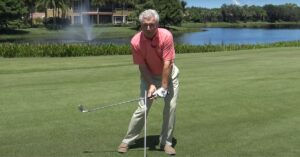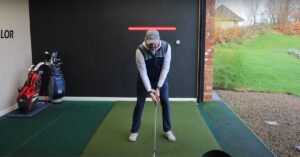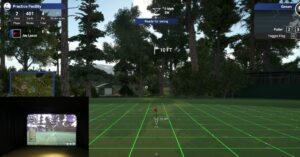How To Stop Standing Up In Golf Swing?
Standing up in your golf swing is a common mistake that can lead to inconsistent shots and missed opportunities on the course. It’s important to address this issue in order to improve your game.
Standing up in your golf swing can cause you to hit the ball thin, fat, or off the toe or heel of the club. By focusing on maintaining your posture and using drills to improve your swing sequence, you can stop standing up and start hitting more consistent shots on the course.
In this article, we’ll explore tips and techniques for stopping the standing-up motion in your golf swing.
How To Stop Standing Up In Golf Swing?
Standing up during your golf swing can negatively impact your shot accuracy and consistency. Maintaining proper posture is essential for technique and control.
To rectify this issue and improve your golf game, you can follow these steps to eliminate standing up in your golf swing:
Importance Of Staying Down
Maintaining a stable posture throughout the swing allows you to generate power, maintain balance, and make consistent contact with the ball. Standing up prematurely can lead to topped shots, slices, or hooks.
Work On Your Setup
Start by ensuring your feet are shoulder-width apart and your weight is evenly distributed. Bend your knees slightly, hinge forward from your hips, and keep your spine straight. This athletic posture sets a solid foundation for your swing.
Focus On Your Lower Body Stability
During the backswing, keep your lower body stable and resist the urge to lift up or straighten your legs. Engage your core muscles to maintain a solid foundation and prevent excessive movement.
Maintain Your Spine Angle
Throughout the swing, it’s crucial to maintain the angle of your spine that you established at setup.
Imagine a straight line running from the top of your head through your spine down to your tailbone. Avoid any upward movement or straightening of the spine during the swing.
Utilize A Controlled Takeaway
During the initial stages of your swing, focus on a smooth and controlled takeaway. Avoid any jerky or abrupt movements that may cause you to stand up. Practice taking the club back low and wide, maintaining the posture you established at setup.
Practice With A Mirror Or Video Analysis
Set up a mirror or use video analysis to observe your swing and check for any signs of standing up.
Pay close attention to your body movements, particularly during the transition from the backswing to the downswing. Use visual feedback to make adjustments and reinforce proper technique.
Train With Drills
Incorporate specific drills into your practice routine to help reinforce the feeling of staying down throughout the swing.
For example, practice hitting half swings or focus on maintaining your posture while swinging with your eyes closed. These drills can help you develop muscle memory and improve your swing consistency.
Seek Professional Guidance
If you’re struggling to correct your standing-up tendency, consider working with a golf instructor or coach.
They can provide personalized guidance, identify any underlying issues, and offer tailored drills and exercises to help you overcome this challenge.
Drills And Exercises To Break The Habit Of Standing Up
Standing up during the golf swing can be a frustrating habit to break, but with the right drills and exercises, you can develop a more stable and consistent swing. Here are some effective strategies to help you overcome this challenge.”
Mirror Check
The mirror check is one of the simplest and most effective drills to combat standing up in your golf swing. Set up a full-length mirror alongside your hitting area, ensuring you have a clear view of your swing.
Take slow practice swings while focusing on maintaining your posture throughout the entire motion. Pay attention to your head, upper body, and lower body alignment, making sure you don’t stand up prematurely.
The mirror will provide immediate visual feedback, allowing you to make corrections and reinforce the correct posture.
Address Position Awareness
Developing awareness of your address position is crucial to preventing the tendency to stand up. Before you start your swing, ensure your knees are slightly flexed and your weight is balanced on the balls of your feet.
Imagine a line running through your body from the top of your head to your tailbone, and strive to maintain that alignment throughout your swing.
Practicing a proper address position consistently will help train your body to resist the urge to stand up.
Resistance Band Drill
Using a resistance band can effectively break the habit of standing up. Attach one end of the band to a stationary object and loop the other end around your waist.
Take your normal stance and initiate your backswing while maintaining tension on the band.
The resistance will encourage you to stay down and prevent any upward movement. Practice this drill regularly to strengthen the muscles that maintain a stable posture.
Lower Body Stability Exercises
Improving lower body stability is essential to maintaining proper posture throughout the golf swing. Incorporate exercises like squats, lunges, and single-leg balance exercises into your fitness routine.
These exercises will help strengthen your legs, core, and glutes, providing a solid foundation for a stable golf swing.
Enhanced lower body stability will make it easier to resist the instinct to stand up and promote a more controlled and powerful swing.
Tempo And Rhythm Practice
Standing up in the golf swing often results from rushing or getting tense during the motion. Working on your tempo and rhythm can help alleviate this issue. Use a metronome or count in your head to establish a consistent rhythm for your swing.
Focus on maintaining a smooth and balanced tempo throughout the swing, avoiding sudden or jerky movements. This deliberate practice will help you stay relaxed and prevent unnecessary upward movement.
Incorporating Mindful Swing Thoughts And Visualization
Mindful swing thoughts and visualization help golfers overcome the tendency to stand up during their swing, improving balance, posture, and overall swing efficiency.
Mindful Swing Thoughts
To counter the tendency to stand up, it’s important to develop and maintain a set of mindful swing thoughts that promote proper posture and balance throughout the swing. Here are a few key thoughts to consider
- Grounding- Focus on the feeling of your feet firmly planted on the ground throughout the swing. Imagine roots growing from the soles of your feet, providing stability and balance.
- Spine Angle- Visualize a straight line running from the top of your head through your spine and down to your tailbone. Maintain this alignment throughout the swing to prevent standing up.
- Engaging the Core- Concentrate on engaging your core muscles to maintain stability and control. This helps prevent any excessive movement or loss of posture during the swing.
Visualization Techniques
Visualization can be a powerful tool in golf, helping golfers mentally rehearse their swings and reinforce correct movements. Here are some visualization techniques to incorporate
- Successful Swings
Close your eyes and imagine yourself executing a flawless swing with perfect posture, balance, and a smooth transition from backswing to downswing. Visualize the ball flying straight and landing on the desired target.
- Slow-Motion Visualization
Imagine yourself performing the swing in slow motion, paying attention to the specific movements and positions that promote staying down through impact. Visualize the feeling of staying connected to the ground throughout the entire swing.
- Muscle Memory Reinforcement
Visualize the correct swing mechanics and sensations in your mind as if you were actually performing them. This mental rehearsal helps reinforce muscle memory and can translate to improved swing execution on the course.
Frequently Asked Questions
You can take steps to correct this problem and improve your swing technique. In this FAQ, we’ll address some key questions about how to stop standing up in your golf swing, providing quick and clear answers to help you overcome this challenge.
How Can I Improve My Posture In The Golf Swing?
To improve your posture, maintain a slight bend in your knees and keep your spine straight. Avoid slumping or hunching over the ball. Engage your core muscles to stabilize your body throughout the swing, which will help prevent standing up.
What Role Does Balance Play In Preventing Standing Up?
Balance is crucial in preventing standing up during the swing. Practice exercises that enhance your balance, such as single-leg exercises and stability drills. This will improve your ability to stay grounded and maintain a consistent swing plane.
How Can I Maintain My Lower Body Stability During The Swing?
To maintain lower body stability, work on keeping your weight centered and balanced between your feet. Avoid swaying or shifting your weight excessively during the swing. Practice proper weight transfer and feel the connection between your feet and the ground to prevent standing up.
Are There Any Specific Drills To Help Me Stop Standing Up In My Swing?
Yes, there are several drills you can incorporate into your practice routine. One effective drill is the “wall drill,” where you stand with your back against a wall and practice making swings without touching the wall. This drill encourages proper posture and prevents standing up by promoting a more compact swing.
Conclusion
Stopping the habit of standing up during your golf swing is crucial for improving your game. Focus on maintaining a strong, balanced posture throughout the swing.
Keep your body relaxed and your eyes on the ball. Practice proper weight transfer and engage your core for stability. Consistency and dedication will lead to better results.






![How Not to Shank the Golf Ball? [Try These Tips And Tricks] how-not-to-shank-the-golf-ball](https://giftedgolfers.com/wp-content/uploads/2023/05/how-not-to-shank-the-golf-ball-300x157.jpg)